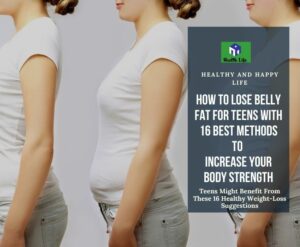Weight loss can be beneficial to people of all ages, even teenagers. Losing extra body fat has been shown to enhance health while also increasing self-esteem and confidence. However, it is critical for adolescents to lose weight in a healthy manner by adopting dietary and lifestyle modifications that are nourishing to their developing bodies and that can be maintained over time. In this article is going to explain how to lose belly fat for teens with 16 effective methods.

Here are 16 effective weight-loss strategies on how to lose belly fat for teens.
1. Establish Goals That Are Healthy And Realistic.
Losing extra body fat is an excellent approach to improve one’s health. However, it is critical to set realistic weight and body-image objectives for yourself. While it is crucial for overweight teenagers to lose extra body fat, the emphasis should always be on improving health rather than on reducing body weight.
A realistic weight target might be beneficial for certain teenagers, but modifying nutrition and boosting physical activity can be far more successful in the long run, according to research. Having healthy role models and understanding that everyone has a distinct body shape are essential for teenagers to grow up in a healthy way.
Success in teen weight reduction is connected with family support and education at home and at school, and these factors can help maintain beneficial lifestyle changes in teens.
2. Reduce Your Intake Of Sweetened Beverages.
One of the most straightforward methods of losing excess weight is to reduce your intake of sugary beverages. Sugary beverages such as sodas, energy drinks, sweet teas, and fruit drinks contain a significant amount of added sugar. A high intake of added sugars has been shown to cause weight gain in adolescents and may also raise their chance of developing certain health issues such as type 2 diabetes, nonalcoholic fatty liver disease, acne, and cavities, according to research.
According to research, kids are more likely to consume sugary beverages if their parents do so as well. As a result, it is helpful to reduce consumption of these harmful beverages as a family.
3. Include Some Form Of Physical Activity.
It is not necessary to join a sports team or go to the gym in order to become physically fit. Simple changes such as sitting less and exercising more are effective ways to lose extra body fat.
Increasing your general daily activity will also help you gain muscle mass, which will allow your body to burn calories more effectively as a result of this.
Finding an activity that you actually love is the key to becoming — and becoming — physically fit, and this may take some time. Every week, experiment with a different sport or activity until you find one that you enjoy. Hiking, bicycling, strolling, soccer, yoga, swimming, and dance are just a few of the activities you may participate in and enjoy.
Participating in physically active activities such as gardening or volunteering for social causes such as park or beach clean-ups are additional fantastic strategies to enhance physical activity levels. More than that, being physically active can assist to improve your mood and has been found to reduce depressed symptoms in teenagers.
4. Provide Your Body With Nourishing Foods To Keep It Going.
In order to consume less calories, rather than counting calories, pick meals that are high in nutrient density. Nutrient density refers to the number of nutrients — such as vitamins, minerals, and fiber — that a food contains.
Because teenagers are still developing, they have greater nutritional requirements than adults for some nutrients such as phosphorus and calcium.
Vegetables, fruits, whole grains, unsaturated fats, and lean protein sources are not only nutritious, but they may also help you lose weight by increasing your metabolism. Consuming fiber-rich foods such as fruits and vegetables as well as protein-rich foods such as eggs, poultry, beans, and nuts will help you feel fuller between meals and may even help you avoid overeating altogether.
Furthermore, research indicates that many teenagers fall short of the nutrient-dense dietary requirements, making it all the more crucial to incorporate these nutritious items in your diet.
5. Don’t Be Afraid Of Fat.
Children and teenagers require more fat than adults due to the fact that their bodies are still developing. When trying to reduce weight, it is usual practice to exclude sources of dietary fat from one’s diet due to the high calorie content of these foods. However, a diet that is excessively low in fat might have a deleterious influence on growth and development.
Instead of dramatically lowering your fat consumption, concentrate on substituting bad fat sources with healthier alternatives. Healthy weight reduction can be achieved by substituting bad fats, such as deep-fried meals and sugary baked goods, with healthy fats, such as nuts, seeds, avocados, olive oil, and fatty fish.
Not only do healthy fats provide energy for your body, but they’re also essential for good brain development and general growth and development.
6. Keep The Amount Of Added Sugars To A Minimum.

Teens have a proclivity to consume items that are heavy in added sugars, such as candy, cookies, sugary cereals, and other sweetened processed meals, among other things.
When attempting to enhance health while also losing extra body weight, reducing additional sugars is critical.
As a result, because most meals that are rich in added sugars are also poor in protein and fiber, they might cause your hunger to fluctuate, resulting in you overindulging throughout the day. According to the findings of a research conducted on 16 young women, those who drank a high-sugar beverage in the morning had stronger sensations of hunger and consumed more food at lunch than those who drank a lower-sugar breakfast beverage.
High-sugar diets not only increase appetite in teenagers, but they can also have a detrimental influence on their academic performance, sleep, and mood.
7. Stay Away From Fad Diets.
Teens who are under pressure to reduce weight rapidly may turn to fad diets for help. There are a plethora of fad diets, some of which are endorsed by well-known celebrities. In order to comprehend that diets, especially restrictive fad diets, seldom work in the long run and can even be hazardous to one’s health, it’s necessary to realize that diets, especially stringent fad diets, rarely work in the long run.
Diets that are very restricted are difficult to maintain and rarely provide your body with all of the nutrients it requires to function at its peak performance.
Furthermore, consuming too few calories might cause weight reduction to be slowed as your body adjusts to the reduced calorie intake. Instead of concentrating on short-term weight reduction, teenagers should concentrate on attaining steady, consistent, and healthy weight decrease over an extended period of time.
8. Consume Plenty Of Vegetables.
Vegetables are a rich source of essential elements such as vitamins, minerals, and dietary fiber.
They also include potent substances known as antioxidants, which protect your cells against unstable molecules (free radicals) that may cause harm to their structure and function. Aside from the fact that vegetables are extremely nutritious, research has shown that ingesting vegetables can assist adolescents in achieving and maintaining a healthy body weight.
In addition to being high in fiber and water, vegetables can help you feel more content after a meal by making you feel fuller. This reduces the likelihood of overeating by ensuring that your appetite remains consistent throughout the day.
9. Avoid Skipping Meals Whenever Possible.
Skipping meals may appear to help you lose weight, but it may actually drive you to eat more during the day as a result of your increased hunger. It has been demonstrated in studies that teenagers who miss breakfast are more likely to be fat than kids who routinely take breakfast.
Making eating a balanced meal a priority, rather than skipping breakfast or grabbing for a quick, high-sugar snack bar, is something teenagers should strive to do.
Additionally, eating a well-balanced breakfast that is strong in protein will help you feel energized and content until your next meal arrives. Twenty teenage females were studied, and it was shown that those who enjoyed a high-protein, egg-based breakfast felt less hungry and snacked less during the day than those who received a low-protein, cereal-based breakfast did.
10. Eliminate Diet Foods From Your Diet.

Foods and beverages promoted as “diet-friendly” may include artificial sweeteners, trans fats, and other components that are detrimental to one’s health. Artificial sweeteners such as aspartame and sucralose have been connected to a variety of health problems, including stomach distress, headaches, and in some cases, weight gain, according to research.
In addition, diet foods and beverages are typically highly processed and lack the nutrients that developing bodies require in order to thrive. Instead of purchasing diet products, go for entire, unprocessed, and satisfying foods for your meals and snacks instead.
11. Experiment With Mindful Eating Techniques.
Mindful eating is the practice of paying close attention to your food in order to establish a more positive connection with food, more bodily awareness, and better control over your food intake. Teens frequently consume meals and snacks on the fly or while distracted by television or cellphones, which can contribute to overeating as a result of stress.
The practice of mindful eating, which includes eating slowly and completely while seated at a table, can help you maintain a healthy weight and develop a healthier connection with food.
Furthermore, research indicates that mindful eating might assist kids in making fewer impulsive food choices, which may help them maintain a healthy body weight. Parents and siblings may engage in mindful eating as well, in order to help teenagers who are attempting to adopt healthy eating practices.
12. Make Sure You Are Properly Hydrated.
Drinking adequate water is essential for general health and can aid in the maintenance of a healthy weight, among other benefits. Water may be substituted for sugary beverages such as soda and sports drinks, which helps to minimize excess calorie consumption and promote healthy weight reduction.
Water consumption throughout the day can also assist in regulating appetite and decreasing the desire to eat when you are not actually hungry. Maintaining sufficient hydration may also help you perform better in school and on the sports field.
13. Don’t Compare Yourself To Other People.
Feeling under pressure to seem a specific way may have a negative impact on anyone’s body image — and adolescents appear to be more vulnerable to body image concerns compared to other age groups.
Teens who are under the effect of peer pressure, social media, and celebrity impact may experience body dissatisfaction. When attempting to reduce extra weight in order to improve one’s health, it is crucial to remember that every person’s body is different and that people lose weight at varying rates of speed.
A desire to appear like someone else should never be the driving force behind a weight loss program. Rather than a means of being healthier, happier, and more secure in one’s own skin, losing weight should be regarded in this light.
Make an effort not to compare yourself to unreasonable expectations. To inspire yourself to adopt a new healthy lifestyle, instead focus on self-empowerment and body image positive.
14. Reduce Stress.

Stress produces hormonal changes, such as higher levels of the stress hormone cortisol, which can lead to an increase in appetite and the accumulation of fat in the body. Although it is normal to experience some stress in one’s life, experiencing excessive stress might have a detrimental influence on weight reduction.
Exercising and spending time in the great outdoors, as well as participating in hobbies like as yoga, meditation, and gardening, can help to reduce stress and create feelings of calm.
Stress-relieving strategies and emotional assistance can be found through school therapists or psychologists, who can also offer help when you’re feeling overwhelmed.
15. Reduce Your Intake Of Processed Foods.
Although having a treat every now and then is absolutely healthy for adolescents, consuming an excessive amount of processed foods might result in weight gain and may make it more difficult to lose weight.
The majority of processed meals are rich in calories while being deficient in essential nutrients such as fiber, protein, vitamins, and minerals, among others. Foods such as vegetables, fruits, healthy fats, and proteins should be the focus of meals and snacks while attempting to live a better lifestyle.
Processed foods such as candy, fast food, sugary baked goods, and chips should be savored as a treat on occasion rather than consumed on a regular basis, according to the American Heart Association.
adolescents may get active in the kitchen and cook fresh meals and snacks with whole, wholesome ingredients instead of depending on convenience foods that are processed.
16. Get A Good Night’s Sleep.
Getting adequate sleep is vital for keeping a healthy body weight and being active. Adults who do not get enough sleep gain more weight than those who obtain the required seven to eight hours of sleep every night, according to studies.
Teens require much greater amounts of sleep than adults. In fact, doctors recommend that teenagers receive 9–10 hours of sleep per day in order to function at their best levels of performance.
Make sure your bedroom is dark and minimize distractions like as watching television or using your smartphone before bed in order to achieve a good night’s sleep.
What Should You Do If Your Weight Loss Plan Doesn’t Work?
There are a variety of additional reasons why teenagers may struggle to lose weight, even when they are following a healthy diet and way of life.
Obtain the Appropriate Diagnosis.
A number of medical problems, including hypothyroidism, polycystic ovary syndrome (PCOS), and depression, can result in rapid weight gain. If you’re having a very difficult time losing weight, you should consult your doctor about your symptoms.
They can conduct tests or refer you to a specialist who can assist you in ruling out medical issues that might cause weight gain and help you lose weight.
Signs And Symptoms Of Binge Eating Disorder
People of various ages are affected by eating disorders, which can include bulimia nervosa, anorexia nervosa, and binge eating disorder (BED). Eating disorders can manifest themselves throughout the adolescent years. Immediately inform a parent or other trusted adult if you believe you may be suffering from an eating disorder.
Parents who see indications of a suspected eating problem in their adolescent should visit their family doctor or pediatrician for further information on treatment options for their child. Eating disorders manifest themselves in a variety of ways, depending on the kind. Examples of warning indicators to keep an eye out for are as follows:
- Dieting on a regular or recurring basis.
- Avoidance of social situations in which food is involved.
- Signs and symptoms of vomiting or laxative abuse
- Excessive physical activity.
- Obsession with one’s physical appearance and/or weight.
- Withdrawal and seclusion from social situations.
- Eating meals or snacks on a regular basis is avoided.
- Extremely rapid weight loss or increase.
What’s The Bottom Line?
Adolescents’ health, self-esteem, and overall quality of life can all be improved by losing extra body weight. However, in order to achieve your weight reduction objectives, it is always advisable to follow safe and healthy weight loss procedures.
Teens may lose weight by reducing added sugars, increasing physical activity, and eating whole, nutritious meals. These are simple, yet effective, methods of weight loss. Teens should keep in mind that having a really healthy body does not imply reaching a specific weight or fitting into a specific clothing size range.
In order to achieve maximum health, it is important to nourish your body with healthy meals and to take good care of it via physical exercise and self-love.
